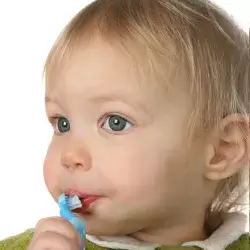
How do you know if your baby is teething?
Teeth, milestones in your baby's life! Did you know that it is during pregnancy that the dental buds develop which will be the source of her future milk teeth!

In general, the first teeth appear around 6 or 7 months.
It happens that some babies are born with one or two teeth (1 /200).
Nature is good because it is also around this age that you will begin to offer it more or less solid food. He can then happily test the practical side of this new tool in his possession.
His 20 baby teeth should be out when he is 3 years old and that's when he he will have to be taught how to brush his teeth.
In what order do teeth grow?

The 20 baby milk teeth will arrive gradually over a period of approximately 30 months.
The order of arrival is substantially the same from one child to another.
We therefore generally observe in the first place the arrival of the two small lower central incisors followed not far behind by the two upper central incisors as well.
Indeed, we often notice that the teeth come out in pairs and symmetrically.
We will then see the upper and lower lateral incisors appear, followed by the molars and then the canines</ strong> and finally secondary molars.
The growth of teeth being hereditary, it's a safe bet that your child will follow the same pattern as you about her teething. If you have teethed early then baby will surely do the same and vice versa.
What are the first signs of teething?
In infants, the appearance of the first milk teeth can be guessed quite easily. In fact, because of the irritation caused by the progressive piercing of the gums by its little "digits", babies tend to show certain signs that are not deceptive. The incessant whining and unexpected awakenings in the middle of the night are the first possible examples. As well as the fact of drooling profusely or chewing everything that falls under his fingers.
Often these warning signs are also accompanied by a mild bout of fever.
More rarely, infants may also suffer from chronic stomach pain, or even real diarrhoea.
The connection between such symptoms and teething is explained by the natural acidification of the oral mucous membranes during the period of teething.
Although Either way, to really get to the bottom of it, the most effective way is to listen directly to your little cherub's mouth. If following this initiative, you notice that the baby's gums are "swollen" by a small scarlet redness marked in the middle by a small depression, there will no longer be any doubt...

How to relieve teething pain?
a certain amount of time. Given the painful conditions in which this push takes place,
finding an effective way to relieve baby is therefore simply a real imperative.
On this issue, homeopathic treatments have largely proven their effectiveness. In this niche, chamomile is at the top of the list, for example, at the height of teething attacks.
During thrust itself, < strong>highly diluted extracts are the most recommended. Then continue this treatment with extracts in low dilution once the "quenottes" come out to relieve the little cherub.
Another alternative: call on the blended chamomile and rhubarb extracts. This type of oral solution is particularly indicated to treat diarrheal symptoms related to irritation of the digestive tract caused by teething. If it is more a question of treating inflammations of the gums, it will be better to opt for the formula with grape extracts (Phytolacca).
In terms of drug treatments this time, several alternatives are also possible. If the child is in too much pain, apply a gum balm directly, this will relieve the pain immediately.
Another solution: use a teething ring. Previously stored in the freezer, it must be given to the infant to chew. Indeed, soaked in a very low dose of anesthetic, it will also provide immediate pain relief.
If all these remedies fail to calm the child's pain, the last resort will then be to administer paracetamol at a pediatric dose in the form of a suppository. In any case, do not hesitate to ask your pediatrician for advice.
Tips for your baby to have good teeth

For your baby to have good teeth, it is imperative that from an early age, he has impeccable oral hygiene.
In short, this means that you must get into the habit of feeding your baby a healthy diet: for example, avoid to get him used to fruit juices all day long, or even to sweeten the contents of his bottle. As we know, sugar promotes the proliferation of bacteria and therefore cavities. Better to give it pure water, without additives.
Similarly, try not to get into the bad habit of tasting your bottle in your mouth. The oral cavity of adults is full of pathogenic bacteria for babies and their teeth. Finally, make sure you clean your teeth properly and frequently after each meal.
Before he is 1 year old, as we said, this will consist of applying a damp compress to his gums and his very first teeth.
Beyond the 12th month, it will be necessary to substitute the toothbrush (for very young children) for the compress. However, absolutely avoid using toothpaste because your child will not be able to spit it out.
Later you can also consider flossing.


